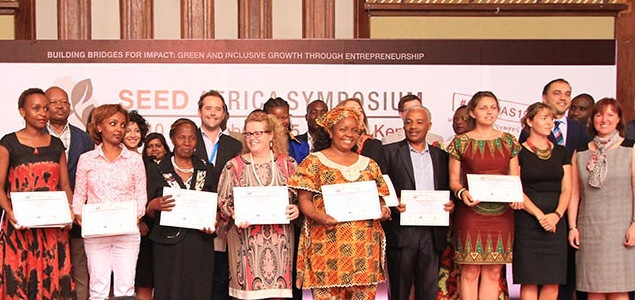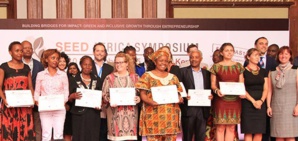Dailycsr.com – 18 September 2015 – In the course of last week, the SEED Africa Symposium of 2015 awarded twenty seven “social and environmental startups” of Africa, who were recognised by the jury. The criteria of the award sought to inspect the communal benefits of the business model of respective startup along with their commitments and involvement “sustainable development challenges”. Moreover, two women-led start-ups received the SEED award for their “focus on gender equality and women’s empowerment”.
The administrator of UNDP, Helen Clark informed:
"Across the African continent, local enterprises are tackling extreme poverty, environmental degradation, and social exclusion. The 2015 SEED Winners are examples of what can happen when local ingenuity meets innovative partnerships. They offer a new, powerful paradigm for sustainable development and green growth based on community empowerment and the collective will for social change."
The winners of SEED Award were given “a financial contribution, technical assistance, free access to different supporting institutions, and other support to develop their business and skills”. Till date, the SEED winners list enumerates about “Over 200 enterprises”, while some of the recipients of 2015 are:
“Kidogo Early Childhood Centres” – that received “Gender Equality Award” for employing women of urban slums who were given the opportunity to attend school besides earning to support their children. Moreover, it helps women to “start their own small businesses in childcare” through its “local microfinancing program”.
“STM Solar Technologies Manufacturing” – for being the first enterprise of Ethiopia that brought in solar lamps and home systems in rural households.
“RK Renew Energy PLC” – for providing “improved cook stoves” across Ethiopian refugee camps which reduces the burden on the refugees for hunting wood fire, fuel expense and environmental threats caused in the process of wood burning.
“East Africa Fruit Farm and Company” – for conducting training sessions to “smallholder farmers” along with equipping them “prepared land” at fair prices whereby cutting down losses owing to post-harvest expenditure through “cold storage and the use of renewable energy”.
“Alternative Energy Source for Heating” – for creating “self-employment opportunities” through youth training camps which teaches them to “produce rice husk briquettes” which are then traded as an alternative to “charcoal and fuelwood” whereby reducing deforestation.
“Masole Ammele” – for developing “organic fish farming skills” in the communities which facilitates “extra income” whereby “raising awareness for ecosystem preservation”.
“O Viveiro” – for starting training sessions on “organic farming” along with “food processing practices” that are enhanced by technology.
“Lighting Up Women’s Lives” – for supporting hundred and fifty women weaver who live in six different rural villages, who then expanded their business into “selling solar lights and batteries”.
“SavvyLoo” – for installing ‘waterless toilet systems’ in temporary settlement areas along with rural regions whereby saving water in a hygienic manner.
“P.E.A.C.E. Thinana Recycling Cooperative” – for cleaning up the neighbourhood, “creating employment”, reducing landfill waste, and spreading awareness about recycling and buy-back options in various communities.
“Vula” – for developing a mobile application with which “frontline rural health professionals” directly get in touch with specialists who guide the former to “improve primary care” which in turn reduces “the impact of treatable and reversible illnesses”.
Moreover, SB writes that:
“The SEED Award winners offer some hope that the UN Sustainable Development Goals can be achieved; they are grassroots solutions to combat the pressing problems related to poverty, hunger, health, education, equality, clean water and sanitation, energy, decent employment, and climate change”.
References:
http://www.sustainablebrands.com
The administrator of UNDP, Helen Clark informed:
"Across the African continent, local enterprises are tackling extreme poverty, environmental degradation, and social exclusion. The 2015 SEED Winners are examples of what can happen when local ingenuity meets innovative partnerships. They offer a new, powerful paradigm for sustainable development and green growth based on community empowerment and the collective will for social change."
The winners of SEED Award were given “a financial contribution, technical assistance, free access to different supporting institutions, and other support to develop their business and skills”. Till date, the SEED winners list enumerates about “Over 200 enterprises”, while some of the recipients of 2015 are:
“Kidogo Early Childhood Centres” – that received “Gender Equality Award” for employing women of urban slums who were given the opportunity to attend school besides earning to support their children. Moreover, it helps women to “start their own small businesses in childcare” through its “local microfinancing program”.
“STM Solar Technologies Manufacturing” – for being the first enterprise of Ethiopia that brought in solar lamps and home systems in rural households.
“RK Renew Energy PLC” – for providing “improved cook stoves” across Ethiopian refugee camps which reduces the burden on the refugees for hunting wood fire, fuel expense and environmental threats caused in the process of wood burning.
“East Africa Fruit Farm and Company” – for conducting training sessions to “smallholder farmers” along with equipping them “prepared land” at fair prices whereby cutting down losses owing to post-harvest expenditure through “cold storage and the use of renewable energy”.
“Alternative Energy Source for Heating” – for creating “self-employment opportunities” through youth training camps which teaches them to “produce rice husk briquettes” which are then traded as an alternative to “charcoal and fuelwood” whereby reducing deforestation.
“Masole Ammele” – for developing “organic fish farming skills” in the communities which facilitates “extra income” whereby “raising awareness for ecosystem preservation”.
“O Viveiro” – for starting training sessions on “organic farming” along with “food processing practices” that are enhanced by technology.
“Lighting Up Women’s Lives” – for supporting hundred and fifty women weaver who live in six different rural villages, who then expanded their business into “selling solar lights and batteries”.
“SavvyLoo” – for installing ‘waterless toilet systems’ in temporary settlement areas along with rural regions whereby saving water in a hygienic manner.
“P.E.A.C.E. Thinana Recycling Cooperative” – for cleaning up the neighbourhood, “creating employment”, reducing landfill waste, and spreading awareness about recycling and buy-back options in various communities.
“Vula” – for developing a mobile application with which “frontline rural health professionals” directly get in touch with specialists who guide the former to “improve primary care” which in turn reduces “the impact of treatable and reversible illnesses”.
Moreover, SB writes that:
“The SEED Award winners offer some hope that the UN Sustainable Development Goals can be achieved; they are grassroots solutions to combat the pressing problems related to poverty, hunger, health, education, equality, clean water and sanitation, energy, decent employment, and climate change”.
References:
http://www.sustainablebrands.com


 African Start-ups Earn Recognition For Their Local Solutions To Sustainable Development
African Start-ups Earn Recognition For Their Local Solutions To Sustainable Development





 Companies
Companies